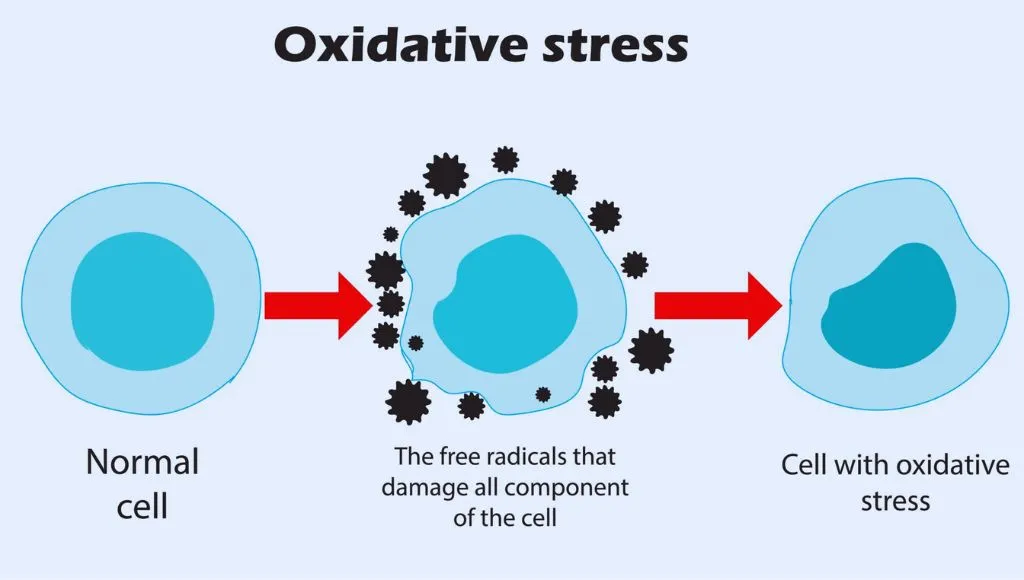Oxidative damage may seem complicated, but it affects everyone. Our bodies create free radicals when using oxygen. These radicals can harm cells, leading to health issues. But there is a way to manage this damage. This article explains about oxidative damage and how it affects our health and offers valuable tips to reduce its impact.
What Is Oxidative Damage?
Our body uses oxygen but can produce unstable molecules called free radicals. These radicals seek stability by reacting with other molecules. This reaction can lead to cellular damage. Over time, oxidative damage can lead to aging and diseases.

The Impact Of Oxidative Damage
It can affect our health immensely. Experts say it can trigger aging and the risk of heart disease, cancer, and diabetes. It may also lead to neurological conditions, including Alzheimer’s disease.
Sources of Oxidative Damage
Knowing the sources of damage is essential. External factors like smoking, pollution, and UV exposure can cause it. Internal factors such as inflammation and metabolic processes are also to be blamed. Recognizing these sources is the first step in reducing their impact.
How Can Oxidative Damage Be Prevented?
To prevent oxidative stress, a diet rich in antioxidants is often recommended. Nutrients like vitamins A, C, and E combat free radicals. A variety of foods are rich in these nutrients. Here are some antioxidant-rich foods:
- Spanish
- Cabbage
- Kale
- Strawberries
- Raspberries
- Blueberries
- Lemons
- Oranges
- Grapefruits
- Bell peppers
- Pumpkin
- Squash
- Tomatoes
- Broccoli
- Sweet potatoes
- Grapes
- Avocados
- Cherries
- Nuts, sunflower Seeds, Sesame Seeds
- Legumes
- Fish, Oysters, and Shrimp
- Green Tea
- Dark Chocolate
How To Reduce Oxidative Damage
Antioxidants are vital in neutralizing free radicals. They provide stability to radicals without becoming unstable themselves. Foods rich in antioxidants are great for combating oxidative stress. The vegetables, fruits, and various other food items mentioned above can help reduce the impact of oxidative damage.
Healthy Lifestyle Choices
A healthy lifestyle is crucial in reducing oxidative stress and damage. Regular exercise boosts this damage. However, ensure that the exercises chosen are moderate. It is essential to avoid overdoing it.
Avoiding smoking and alcohol intake is also very important. Manage stress as chronic stress can worsen oxidative stress. Try including meditation, yoga, and relaxation activities which can be helpful. Moreover, Adequate sleep is indispensable as it allows the body to repair itself and combat this damage.
Importance Of A Balanced Diet
Our diet influences oxidative stress and damage levels. A diet full of fruits, vegetables, and whole grains provides antioxidants. Healthy fats found in olive oil and fish can reduce oxidative stress. Limiting processed foods and sugars is crucial to reducing oxidative stress.
How Harmful Is Oxidative Stress?
Not all free radicals are harmful. They can cause oxidative stress, eventually leading to oxidative damage, but understanding them is important. They play an important role in some normal and essential cell processes. Free radicals help our immune system fight viruses and bacteria that invade our bodies. Our body creates free radicals to protect itself from harmful elements.
Even during exercise, our bodies produce some free radicals. This production is not just a side effect; it is necessary. Regular exercise and physical activity have benefits like making muscle cells more responsive to insulin. Although our bodies need some free radicals, excessive oxidative stress can be damaging.
Do Supplements Always Work?
Oxidative stress and the use of supplements to combat it are still topics of mixed opinion. Experts warn that supplements may not always protect against diseases caused by oxidative stress. They suggest that supplements may not provide the expected protection against oxidative stress and, hence, the damage caused by it.
Yet, there are certain situations where supplements can be helpful or even necessary. For example, osteoporosis patients might need calcium supplements with their doctor’s guidance. In countries like the United States, people can lower the stress and damage by eating well and getting nutrients.
Dealing with oxidative damage is about balance. Our bodies need free radicals for health. But too many can cause issues. To lower oxidative stress and damage, eat foods rich in antioxidants, live healthily, and use supplements wisely. We can lead a healthy life by choosing a more nutritious diet, exercising, and managing stress. All these things help us avoid the adverse effects of oxidative stress.

